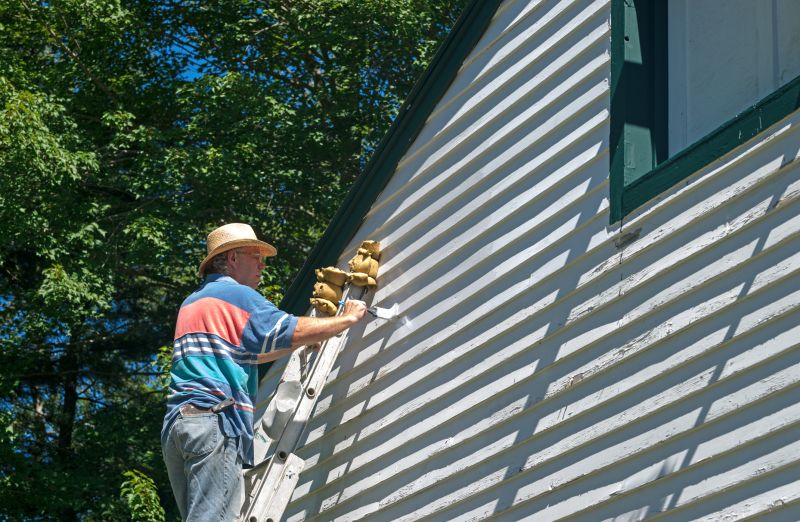Favorite Products For Siding Service And Repair Work
Browse a curated list of essential items that help achieve flawless siding results with ease and precision.
 In Oroville, California, maintaining the integrity and appearance of building exteriors often involves selecting the right products for siding service. The variety of options available allows homeowners and contractors to choose materials that suit their aesthetic preferences, durability needs, and budget considerations. From traditional sidings like vinyl and wood to modern composite and metal options, each material offers unique benefits and challenges. Proper selection and application of these products can enhance curb appeal and provide long-lasting protection against the elements.
In Oroville, California, maintaining the integrity and appearance of building exteriors often involves selecting the right products for siding service. The variety of options available allows homeowners and contractors to choose materials that suit their aesthetic preferences, durability needs, and budget considerations. From traditional sidings like vinyl and wood to modern composite and metal options, each material offers unique benefits and challenges. Proper selection and application of these products can enhance curb appeal and provide long-lasting protection against the elements.
Top Overall Option
Fiber Cement Siding
Fiber cement siding is a versatile and durable material that offers a balance of aesthetic appeal and resilience. It is resistant to pests, fire, and moisture, making it suitable for various climates and conditions. Its ability to mimic the appearance of wood or masonry allows for customization without sacrificing strength. Properly installed fiber cement siding can provide long-term performance with minimal maintenance, making it a popular choice for many property owners seeking a reliable exterior solution.
Types of Products For Siding Service
Vinyl Siding
A popular low-maintenance option that is available in a wide range of colors and styles, vinyl siding is easy to install and replace.
Wood Siding
Traditional and aesthetically appealing, wood siding offers natural beauty but requires regular upkeep to prevent decay.
Fiber Cement Siding
Known for its durability and versatility, fiber cement siding provides resistance to pests, fire, and moisture.
Metal Siding
Metal siding, including aluminum and steel, offers strength and modern appearance with high resistance to weathering.
Engineered Wood Siding
A manufactured alternative to traditional wood, engineered wood siding combines durability with a natural look.
Brick Veneer
A lightweight option that mimics traditional brick, providing a classic appearance with easier installation.
Stone Veneer
Stone veneer offers a natural aesthetic and durability, suitable for accent walls or entire facades.
Composite Siding
Made from a mixture of materials, composite siding provides a customizable appearance with enhanced durability.
Insulated Siding
Integrated with foam insulation, this siding improves energy efficiency and adds an extra layer of protection.
PVC Siding
A type of plastic siding that is lightweight, resistant to moisture, and easy to maintain.
Popular Choices
A widely used siding material known for its affordability and low maintenance needs.
Chosen for its durability and aesthetic flexibility, suitable for various architectural styles.
Favored for its natural look, often selected for historic or traditional homes.
Popular for its modern appearance and resilience in diverse weather conditions.
A trending alternative to traditional wood, appreciated for its combination of appearance and durability.
Increasing in popularity due to its energy-saving benefits and improved exterior protection.
Often selected for its classic look and long-lasting performance.
Popular for accent features and enhancing curb appeal with natural textures.
Gaining traction for its customizable options and resistance to weathering.
Chosen for its lightweight nature and ease of installation.
When considering siding products, it's important to evaluate factors such as weather resistance, ease of installation, maintenance requirements, and compatibility with existing structures. For instance, regions like Oroville with seasonal weather variations benefit from materials that resist moisture and temperature fluctuations. Additionally, the choice of siding can influence insulation performance and energy efficiency, contributing to overall building comfort.
Professional installation is often recommended to ensure optimal performance and longevity of siding products. Using the right tools and techniques can prevent issues like warping, cracking, or detachment over time. Regular maintenance, including cleaning and inspections, helps preserve the appearance and structural integrity of the siding. By selecting appropriate products and adhering to best practices, property owners can achieve a durable and attractive exterior that withstands the local climate.
Ultimately, the right siding products can significantly impact the look and durability of a building. Whether updating an existing structure or constructing a new one, understanding the options available in the market is essential for making informed decisions that align with specific project needs and preferences.
Key Buying Considerations
- Climate suitability: Choose materials that withstand local weather patterns, including moisture, temperature changes, and wind.
- Durability: Consider resistance to pests, rot, fire, and impact damage based on your environment.
- Maintenance requirements: Evaluate how much upkeep the product needs over its lifespan.
- Aesthetic versatility: Select siding options that complement your home's architectural style and personal preferences.
- Ease of installation: Determine whether professional installation is recommended or if DIY is feasible.
- Cost and budget: Balance initial costs with long-term durability and maintenance expenses.
- Insulation properties: Consider siding with integrated or added insulation for energy efficiency.
- Compatibility: Ensure the siding material works well with existing structures and other exterior components.
- Environmental resistance: Look for products that resist mold, mildew, and UV damage.
- Availability: Check local supply options and availability for timely project completion.
- Warranty and support: Review manufacturer warranties and customer support options.
- Environmental factors: Consider exposure to salt, pollution, or other elements that could affect material longevity.
- Installation complexity: Be aware of the tools and skills required for proper installation.
- Resale value: Select siding that maintains or enhances your property's curb appeal.
